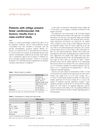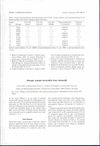 68 citations,
January 2015 in “Indian Journal of Dermatology”
68 citations,
January 2015 in “Indian Journal of Dermatology” Microneedling can effectively promote new hair growth in men with hair loss who didn't improve with traditional treatments.
 14 citations,
July 2015 in “Journal of Cosmetic Dermatology”
14 citations,
July 2015 in “Journal of Cosmetic Dermatology” Sebaceous glands in male pattern hair loss patients have more lobules and might cause early hair growth phase shifts.
 17 citations,
December 2011 in “Journal of the European Academy of Dermatology and Venereology”
17 citations,
December 2011 in “Journal of the European Academy of Dermatology and Venereology” People with vitiligo may have a lower risk of heart disease.
 4 citations,
June 2015 in “Journal of Genetics/Journal of genetics”
4 citations,
June 2015 in “Journal of Genetics/Journal of genetics” Genetic differences within ethnic groups may affect prostate cancer treatment effectiveness.
 2 citations,
May 2022 in “Diagnostics”
2 citations,
May 2022 in “Diagnostics” Vitamin D levels in hair don't match those in blood, so hair isn't a reliable indicator of Vitamin D status.
 2 citations,
August 2019 in “Turkish Journal of Chemistry”
2 citations,
August 2019 in “Turkish Journal of Chemistry” Researchers made minoxidil efficiently using cobalt ferrite nanoparticles as a reusable catalyst.
2 citations,
April 2022 in “Biomedicines” Low-frequency electromagnetic fields may help hair growth by affecting certain growth-related molecules.
2 citations,
December 2021 in “Pharmaceutics” Finasteride-loaded proniosomes effectively promote hair growth in mice.
 2 citations,
January 2023 in “Journal of Clinical Medicine”
2 citations,
January 2023 in “Journal of Clinical Medicine” People with hair loss conditions may also have thyroid disorders, but more research is needed to understand the connection.
 2 citations,
January 2018 in “DOAJ (DOAJ: Directory of Open Access Journals)”
2 citations,
January 2018 in “DOAJ (DOAJ: Directory of Open Access Journals)” The most effective way to diagnose non-scarring hair loss is by transverse sectioning, and some cases, particularly in males with inflammation around hair follicles, might be curable.
 7 citations,
June 2015 in “Cutaneous and Ocular Toxicology”
7 citations,
June 2015 in “Cutaneous and Ocular Toxicology” Some drugs can cause skin reactions, which may improve when the drug is stopped, and rapid diagnosis and stopping the drug is crucial.
 2 citations,
July 2023 in “International Journal of Molecular Sciences”
2 citations,
July 2023 in “International Journal of Molecular Sciences” BFNB could be a promising treatment for hair growth.
 39 citations,
May 2011 in “European Journal of Clinical Investigation”
39 citations,
May 2011 in “European Journal of Clinical Investigation” Hirsutism can be caused by various conditions besides PCOS, and it's important to treat the underlying issue and manage symptoms with medication and cosmetic approaches.
 2 citations,
October 2016
2 citations,
October 2016 Chemotherapy and radiotherapy can cause skin side effects like rashes, hair loss, and nail changes, which are usually managed with conservative treatments.
 62 citations,
July 1993 in “Journal of Investigative Dermatology”
62 citations,
July 1993 in “Journal of Investigative Dermatology” Hair growth is influenced by interactions between skin layers, growth factors, and hormones, but the exact mechanisms are not fully understood.
 59 citations,
August 2014 in “International Journal of Biological Macromolecules”
59 citations,
August 2014 in “International Journal of Biological Macromolecules” The study found an efficient method to extract antioxidants from Hibiscus leaves.
 9 citations,
January 1992 in “Contact Dermatitis”
9 citations,
January 1992 in “Contact Dermatitis” Some people using minoxidil for hair loss developed an allergic skin reaction, often related to an ingredient that helps minoxidil work better.
 3 citations,
April 2019 in “bioRxiv (Cold Spring Harbor Laboratory)”
3 citations,
April 2019 in “bioRxiv (Cold Spring Harbor Laboratory)” Beta-caryophyllene, found in essential oils, helps wounds heal better in multiple ways.
 3 citations,
May 2020 in “bioRxiv (Cold Spring Harbor Laboratory)”
3 citations,
May 2020 in “bioRxiv (Cold Spring Harbor Laboratory)” The unique coat of lykoi cats is likely caused by new variants in the Hairless gene.
 May 2020 in “bioRxiv (Cold Spring Harbor Laboratory)”
May 2020 in “bioRxiv (Cold Spring Harbor Laboratory)” The study found that certain genes are important for hedgehog skin appendage development and immunity, with spines possibly evolving for protection and infection resistance.
3 citations,
July 2023 in “Biomolecules” B2m-free HLA variants may be a new class of HLA important in immune responses and diseases.
 September 2023 in “International journal of women’s dermatology”
September 2023 in “International journal of women’s dermatology” Certain hairstyles, diabetes, scalp infections, and vitamin D deficiency may increase the risk of hair loss in Black women; more research is needed for better treatment.
 November 2022 in “bioRxiv (Cold Spring Harbor Laboratory)”
November 2022 in “bioRxiv (Cold Spring Harbor Laboratory)” MOF controls skin development by regulating genes for mitochondria and cilia.
22 citations,
May 2019 in “Animals” High hair cortisol levels indicate stress in cows due to poor shelter conditions and health issues.
 140 citations,
March 2013 in “The journal of immunology/The Journal of immunology”
140 citations,
March 2013 in “The journal of immunology/The Journal of immunology” Memory regulatory T cells need IL-7, not IL-2, to stay in peripheral tissues.
 4 citations,
January 2013 in “Advances in Experimental Medicine and Biology”
4 citations,
January 2013 in “Advances in Experimental Medicine and Biology” Certain transcription factors are key in controlling skin stem cell behavior and could impact future treatments for skin repair and hair loss.

Ajuga reptans L. extracts have strong antioxidant, anti-inflammatory, liver-protective, antimicrobial, and wound-healing properties.
 July 2023 in “bioRxiv (Cold Spring Harbor Laboratory)”
July 2023 in “bioRxiv (Cold Spring Harbor Laboratory)” The mesenchyme can start hair growth, but the exact signal that causes this is still unknown.
 June 2024 in “Research Square (Research Square)”
June 2024 in “Research Square (Research Square)” Young women in West Bengal, India, with PCOS often have estrogen resistance, leptin receptor issues, folate deficiency, T2DM, and acanthosis, commonly linked to obesity.
 222 citations,
January 2014 in “International journal of reproductive medicine”
222 citations,
January 2014 in “International journal of reproductive medicine” Insulin resistance and obesity are key factors in the development and worsening of polycystic ovary syndrome, and lifestyle changes are important for managing it.


























